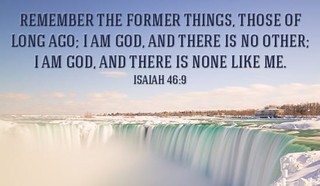
- Recent Translations
- All Translations
Isaiah 46:5
Share
Settings
Images for Isaiah 46:5

Isaiah 46:5 Meaning and Commentary
To whom will ye liken me?
&c.] Was it lawful that any likeness might be made, which yet is forbidden, ( Exodus 20:4 ) what likeness could be thought of? is there any creature in heaven or earth, among all the angels or sons of men, to whom God can be likened, who has done such works of power, and acts of grace, as to care and provide not only for the house of Israel, from the beginning of their state to the close of it, but for all his creatures from the beginning of life to the end thereof, yea, from the beginning of the world to the end of it, and has shown such special grace and goodness to his chosen people, in such a kind and tender manner? And make me equal;
or any equal to him in power and goodness, since all are but worms, dust, and ashes, as the small dust of the balance, yea, as nothing in comparison of him. And compare me, that we may be like?
which is impossible to be done; for what comparison or likeness can there be between the Creator and a creature, between an infinite, immense, and eternal Being, possessed of all perfections, and a finite, frail, imperfect one? see ( Isaiah 40:18 ) . To pretend to frame a likeness of such a Being, is to act the absurd and stupid part the Heathens do, described in the following verses.